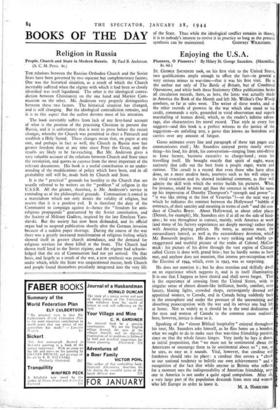BOOKS OF THE DAY
Religion in Russia
THE relations between the Russian Orthodox Church and the Soviet State have been governed by two separate but complementary factors. One was the historical situation, as a result of which the Church inevitably suffered when the regime with which it had been so closely identified was itself liquidated. The other is the ideological contra- diction between Christianity on the one hand and Marxist Com- munism on the other. Mr. Anderson very properly distinguishes between these two factors. The historical situation has changed, and is still changing. Bat the ideological contradiction remains, and it is to this aspect that the author devotes most of his attention.
The book inevitably suffers from lack of any first-hand account of what is the position of the practising Christian in present day Russia, and it is unfortunate that it went to press before the recent changes, whereby the Church was permitted to elect a Patriarch and establish a Holy Synod. These changes mean that, on paper at any rate, and perhaps in fact as well, the Church in Russia now has greater freedom than at any time since Peter the Great, and the results are likely to be far-reaching. But Mr. Anderson gives a very valuable account of the relations between Church and State since the revolution, and quotes in extenso from the more important of the relevant documents. His book is a useful contribution to an under- standing of the modifications of policy which have been, and in all probability still will be, made both by Church and State.
It is the " practical " grounds for hostility to the Church that are usually referred to by writers on the " problem " of religion in the U.S.S.R. All the greater, therefore, is Mr. Anderson's service in reminding us of the philosophical grounds. Communism is rooted in a materialism which not only denies the validity of religion, but asserts that it is a positive evil. It is therefore the duty of the Communist to campaign against it—hence the " freedom for anti- religious propaganda " guaranteed by the Soviet constitution, and the Society of Militant Godless, inspired by the late Emelyan Yaro- slayski. But the society has now been disbanded, and its official organ had to suspend publication shortly after the German invasion because of a sudden paper shortage. During the course of the war there was a greatly increased manifestation of religious feeling which showed itself in greater church attendance, and the demand for religious services for those killed at the front. The Church had shown itself loyal to the Soviet regime, and the regime had acknoW- ledged that the era of Communism had not yet arrived. On that basis, and largely as a result of the war, a new synthesis was possible under which, while the State was unquestioned master, both Church and people found themselves peculiarly integrated into the very life of the State. Thus while the ideological conflict remains in theory, it is to nobody's interest to revive it in practice so long as the present


























 Previous page
Previous page